Forceful Conduct: The Anthony Graber Case
by Sutton Stokes
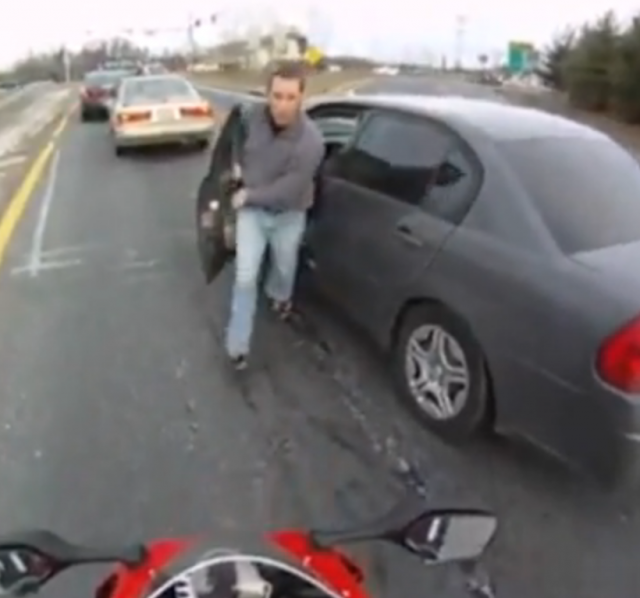
Earlier this year, a man named Anthony Graber was breaking the law on his sport bike (allegedly, etc.) along a stretch of Interstate 95 in Maryland, helmet cam rolling. Graber later posted the resulting video to YouTube, so anybody who wants to can watch him weave in and out of traffic, steer one-handed, and supposedly pop a wheelie.
About three minutes into the video, Graber turns his head and the camera catches a gray sedan about fifty yards behind him.
A few seconds later, Graber slows to a stop in a traffic line on an exit ramp. There, at about minute 3:10, the gray sedan noses into and blocks his lane.
The sedan’s door flies open and a man with a distinct resemblance to Pee Wee Herman, but wearing jeans and a fleece pullover, jumps out and rushes toward Graver.
The man is holding a gun and yelling “get off the motorcycle.”
The man with the gun yells “get off the motorcycle” a total of three times before he adds “state police.”
Graber departed that encounter with nothing more than a speeding citation; his real trouble started when he published the video. A county prosecutor decided to charge him with violating the Maryland Wiretap Act, for which he could be sentenced to as many as sixteen years in prison.
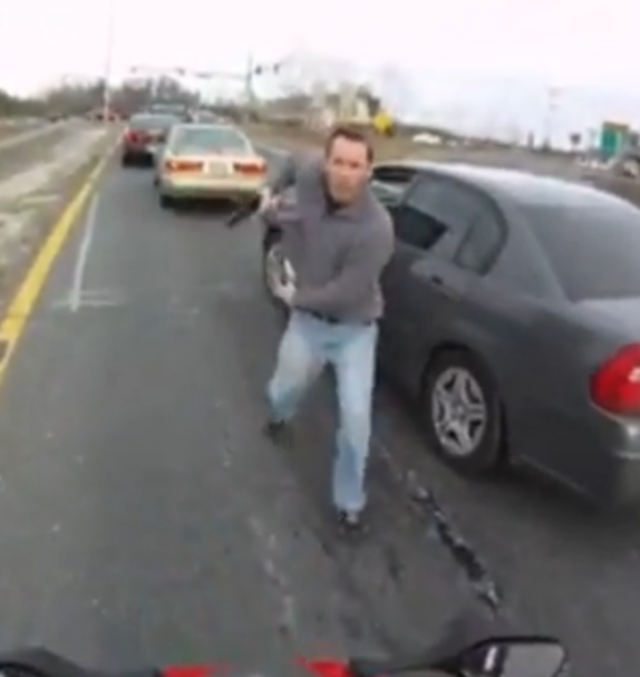
He probably won’t be. In July, the Maryland Office of the Attorney General called bullshit, sharing its opinion that, essentially, what’s good for the goose is good for the gander: under Maryland law, private citizens have just as much right to record traffic stops as police do (PDF). But the AG’s opinion is advisory and non-binding; it’s still up to the Harford County prosecutor whether the case will proceed to trial, and people have been convicted on similar charges in other states.
Graber’s experience has excited a lot of interest nationwide. A man named Carlos Miller, who runs the blog Photography is Not a Crime, has been following Graber’s case closely, and Time just joined the party with an August 4th article by one Adam Cohen that ran under the headline “Should Videotaping the Police Really Be a Crime?”
Perhaps not surprisingly, Cohen concludes that, no, it shouldn’t: “If the police are doing their jobs properly, they should have nothing to worry about.”
I see the logic behind what he’s saying. And I don’t disagree with the idea that members of a free society should damn well be able to videotape the people they commission to enforce laws behind badges and guns. And yes, we must therefore resist what seems to be a rising tide of police resistance to being videotaped.
But we might as well try to understand why police don’t like to be videotaped, and it’s not necessarily because they fear losing the impunity to misbehave, which is what I take Cohen to be implying.
It could also be because, even when “police are doing their jobs properly,” it often doesn’t look like they are. Not to the untrained observer, anyway.
* * *
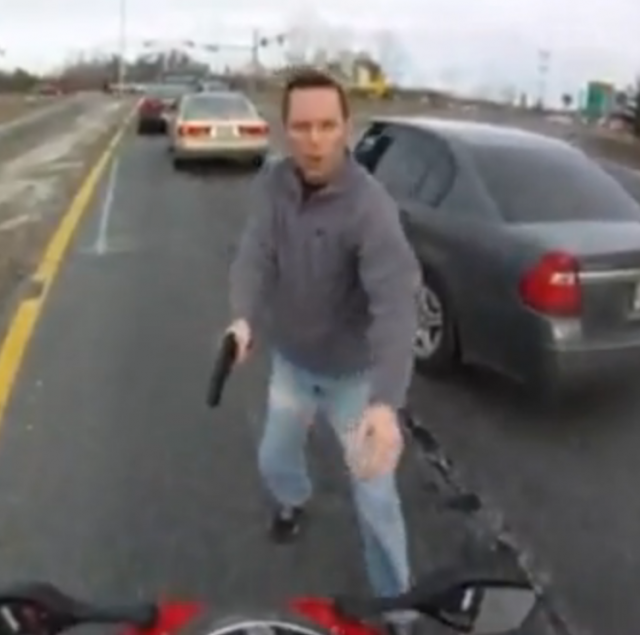
Back in my use-of-force class at the U.S. Coast Guard’s Maritime Law Enforcement school, the instructor-who, judging by the number of pushups he made us do, was not at all tolerant of the possibility that we might do our jobs the slightest bit improperly-was firmly of the opinion that videotaping might give us something to worry about.
He unequivocally told us never to bring a camera along on a boarding.
The Coast Guard doesn’t have anything like dashboard cams yet, and we should count ourselves lucky, he told us.
Law enforcement just doesn’t look right to civilians, even if you are doing everything exactly the way the way you have been trained to do it.
In the ensuing years, I’ve had countless opportunities to reflect on just how right he was.
You have only to glance, for example, at the photograph that Gizmodo chose to illustrate its own recent post on the increasing use of cameras “to depict police abuse,” including in the Graber case.
In the photo, not one but two police officers have their knees on someone’s back, pressing him face-first into the concrete as they cuff him. And how is that fair?
Clearly, this is a prima facie example of “police abuse.”
Except no, it’s not.
Without knowing more about the events that led up to the scene in that photo, all we can say is that it shows two police officers trying to handcuff someone who doesn’t want to be handcuffed. Handcuffs are tiny-pretty much exactly wrist-sized, for obvious reasons-so if the person you are trying to cuff is moving his wrists around even a little, you aren’t going to prevail without either a very uneven struggle (at least two against one, preferably three) or, if you are alone, without inflicting enough pain to get your “subject” to see things your way.
Combine that with 1. the way even the most mild-mannered people can react to the feel of actual cold steel locking closed on their wrists and 2. the fact that the moment of cuffing is one of the most dangerous for police, because they have to get inside arm’s reach of someone who is probably not very thrilled with them-and you may start to understand why police can assume such a dominant posture when it comes time to put on the bracelets.
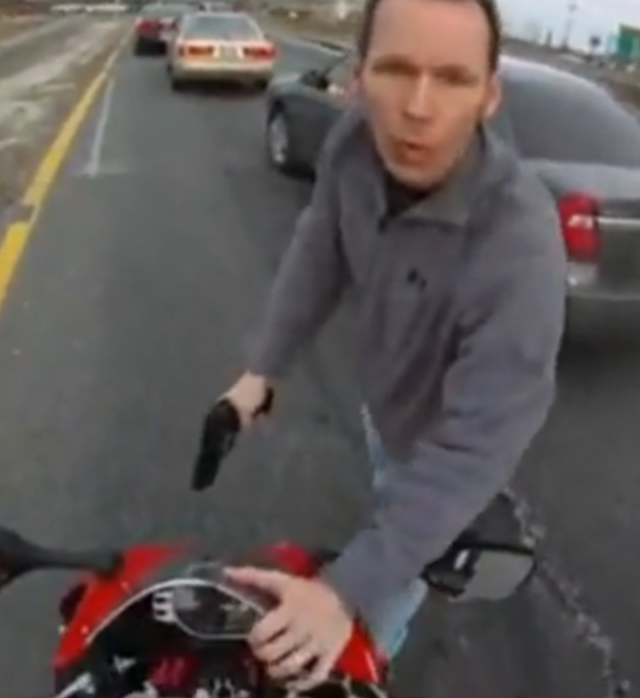
And while many police may be trained-as I was-to handle “passive” and “active” resistance differently, the bar for “active” is low: simply trying to tug your arm away from a cop who has grabbed it can be an express ticket straight past “commands and consequences” to some decidedly less pleasant locations on the “use of force continuum.”
Which gets back to what my instructor was saying. The cops in that photo may be doing exactly what they’ve been trained to do, maximizing their own safety and minimizing the chances of the arrestee getting a broken wrist. (Without more context, we can’t eliminate the possibility that they might coincidentally also be assholes, of course. Some cops are. So are some bus drivers and senators.)
To the casual observer, though, it looks like this: an arrestee who wasn’t “struggling” and didn’t even throw a punch is suddenly in the middle of a three-cop pile-on, and it just doesn’t look right.
* * *
Then again, sometimes videos do capture cops doing their jobs improperly, which seems to be the case in the Graber video.
Aside from the question of pulling a gun on a speeder-we were trained that, if you think you need your gun out, you need your gun out-it certainly seems like a problem that this cop both has his gun out and says three complete sentences to Graber before identifying himself as a police officer.
It also seems like a big problem that he never shows a badge at all.
Look at the expression on the cop’s face as he puts his gun away, seemingly upon noticing the arrival of the marked cruiser that becomes visible later when Graber dismounts. Who can say what he’s thinking, but if I had to make a wager, it wouldn’t be that he is confident that he is entirely in the right.
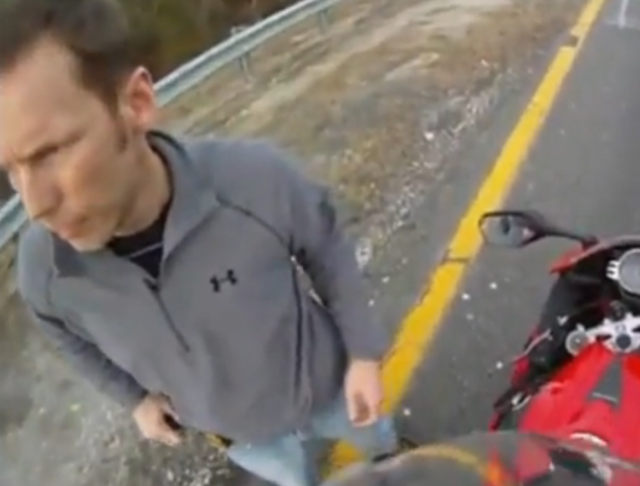
For that matter, it is interesting to consider the fact that, while the existence of Graber’s camera is still a secret at this point, the cop knows he is downrange of the one on the uniform’s dashboard. Is he already thinking about videos and whether or not he is ready for his closeup?
Anyway, I failed my first use-of-force practical exam for pretty much the exact same mistake this trooper made-not explaining quickly and clearly who the hell he is and why anyone should do anything other than run away from or preemptively open fire on the road rager with the gun. I think Graber’s video could have a second, more fruitful life as an illustration to academy cadets of what not to do in similar situations.
Of course, the video is already out; whatever damage it can do has been done. The target of the Graber prosecution isn’t Graber-it’s all of the people who might think of making their own video later. It’s hard to avoid concluding that the authorities want to inspire the following thought before anyone else decides to hit the red button: “Yes, the charges may eventually be dropped, but is it really worth the hassle?”
You really have to like the taste of your master’s boot leather for the answer to that question to be anything but “yes,” but then that’s easy to say from the safety of my laptop. Here’s hoping that at least some of us continue to find the courage of our convictions when it actually matters. Just because some cops have some relatively good reasons for preferring not to be videotaped doesn’t mean the rest of us have to care.
Sutton Stokes will certainly record any encounters he has with the West Virginia State Police.
